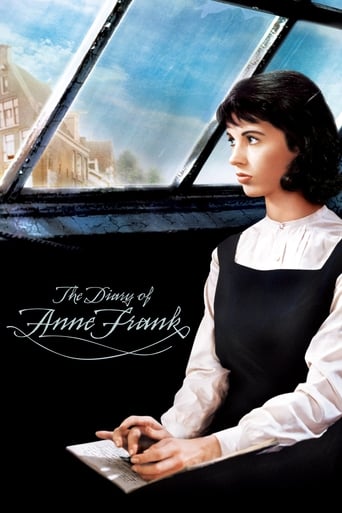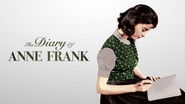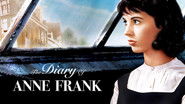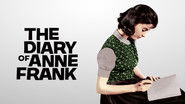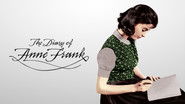frankwiener
Firstly, Director George Stevens ("Gunga Din", "Place in the Sun", "I Remember Mama") must be commended for his ability to create the dark, claustrophobic conditions experienced by eight Dutch Jews hiding for two entire years in the stifling attic of a small Amsterdam spice factory while he was forced by Fox executives to film their story in glorious CinemaScope. This was an impressive accomplishment by itself. As the head of a combat motion picture unit at the end of World War II in Europe, Stevens was deeply affected by the horrors that he had experienced, including the Normandy invasion and the liberation of the Dachau concentration camp. Unlike films depicting the large-scale conditions of utter de-humanization that existed in the Nazi concentration camps, this movie enabled Stevens to present a view of Nazi victims while they were still able to salvage what little humanity remained within them. In spite of the very difficult circumstances of the Jews in hiding, the victims were still able to maintain at least some form of civility and respectability in their interactions with each other.Not to be overlooked is the separate but related story of the astoundingly brave Dutch citizens who risked their very lives in order to protect their Jewish neighbors. These courageous acts of righteousness occurred in European nations throughout the Nazi occupation, and are never to be underestimated or taken for granted. Imagine risking your own life and those of your loved ones by daring to resist the extreme brutality of the Nazi regime so that others might live. For me, the most powerful scene was of the Nazi transport vehicle screeching to a halt before the address of the hiding place while the dramatic music rises and the menacing, two note Euro siren blasts throughout the streets of Amsterdam. After two agonizing years of confinement, the worst nightmare had suddenly become a reality for the group in hiding. I don't think that Mr. Stevens could have presented this climactic scene more forcefully and perfectly.With minimal cinematic support, the small cast of actors, along with the extraordinary skills of Mr. Stevens, faced the daunting task of carrying the movie from start to finish, and they succeeded very, very well. For me, Shelley Winters and Lou Jacobi as the frustrated, bickering couple stood out from the rest. They could have been my aunt and uncle or the neighbors down the street. They were that real in spite of the fact that they were reading lines written for them by someone else, something that still amazes me when I watch exceptional acting. Ms. Winters was especially gracious to donate the Oscar that she won from her work here (the other was for "Patch of Blue") to the Anne Frank Museum in Amsterdam as she promised Anne's father, Otto Frank.I have read some criticism among reviewers here of Millie Perkins for her interpretation of Anne, but I don't agree with it. Mr. Frank approved of her casting as his beloved daughter, and that is good enough for me. I have a feeling that Anne would have approved of her too and that Millie would have taken a very prominent place in Anne's cherished film star book, had she only survived the war.The only criticism I have is that the film could have been shortened significantly, not for my sake but for that of all of those folks, including the many IMDb reviewers, who felt that it ran too long. As the film has a very significant, personal connection to me, I was completely engrossed by the dialogue and by the outstanding performances on the part of the entire cast. I am more concerned about the vast majority of viewers who do not have any personal linkage to the film's reenacted situation and who may lose their interest in a story that must be told so that the horrific crimes committed less than 75 short years ago will not be repeated. While an estimated 60 million people were killed during that global cataclysm, the systematic, highly organized. and meticulously planned campaign of genocide by the Nazis of Germany against the mostly defenseless, civilian Jews of Europe is unprecedented. This film illustrates the story not only of Anne but of seven other human beings who were doomed to destruction not because of any specific act that they committed but by the mere fact that they were Jews. Unless we truly learn from the past, we seriously risk repeating it.
amour88
This was an amazing movie. It's long almost 3 hours but so worth it. You really feel the terror,paranoia and tension. Your heart breaks with them. It's not too accurate in regards to the book but if you can get past that it really is an excellent film. The movie is not too violent for a film that takes place during the war. Anne while going through an unimaginable situation still remains mostly positive. Her quote "In spite of everything, I still believe that people are really good at heart" really captures that.Anne's story and so many others like her must continue to be told. This movie really shows what it must have been like to stay in hiding for years. Never being able to go outside,have a breath of fresh air. This is a movie I think everyone needs to see at least once.
kenjha
The famous story of the Jewish girl hiding in an attic in Nazi-occupied Amsterdam receives an impressive screen treatment. Pretty much the entire film takes place inside the cramped attic, and it's a credit to Stevens that a three-hour film in a confined setting manages to remain engaging. Perkins has been unjustly criticized for her performance. She is perhaps a bit too perky in her film debut, but she mostly does well with her expressive face and charming manner. Schildkraut is fine as the father, as are Winters and Beymer as members of another family sharing the attic. In fact, all the acting is good with the exception of Jacobi and Wynn, who come off as rather cartoonish.
williwaw
George Stevens was a great director, one of the best and who could argue with his body of work: I Remember Mama, Shane, The More The Merrier, Giant, and working with great stars such as Jean Arthur, Cary Grant, Irene Dunne, Rock Hudson, Elizabeth Taylor, Monty Clift, Katharine Hepburn, James Dean, Barbara Stanwyck, et al, the point I am making is that George Stevens cast his movies accurately, very well. The cast here is good and especially liked Richard Beymer, but the problem with Diary of Anne Frank is the star role: Millie Perkins who got the big push at 20th in the 50's is given the title role of Anne Frank. Try as Ms. Perkins does, there is not a connection with the character. Who could have played Anne? Audrey Hepburn was the logical choice but Audrey Hepburn may have felt the role too close for comfort having lived thru the Nazi terror herself in Holland. This film shot on a stage at 20th Century Fox in Los Angeles is admirable and loving attention to detail but the central character is miscast (just as Max Von Sydow a fine actor could not portray Jesus Christ in Mr. Stevens Greatest Story Ever Told)By the way while Giant, and Shane would prove otherwise, Kate Hepburn always felt that George Stevens was best at Comedy and lost his edge his later dramatic films Anne Frank, and Greatest Story Ever Told may have proved Katharine Hepburn correct. George Stevens swan song The Only Game In Town set in Vegas but shot in Paris to accommodate Elizabeth Taylor's tax concerns was a poor finale to a great Director's career
